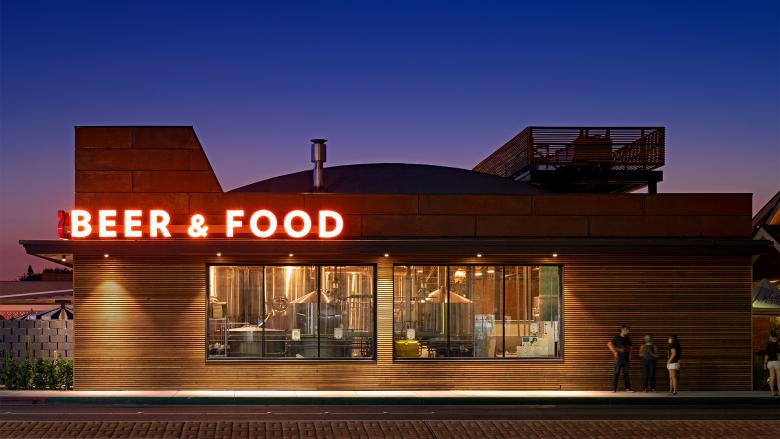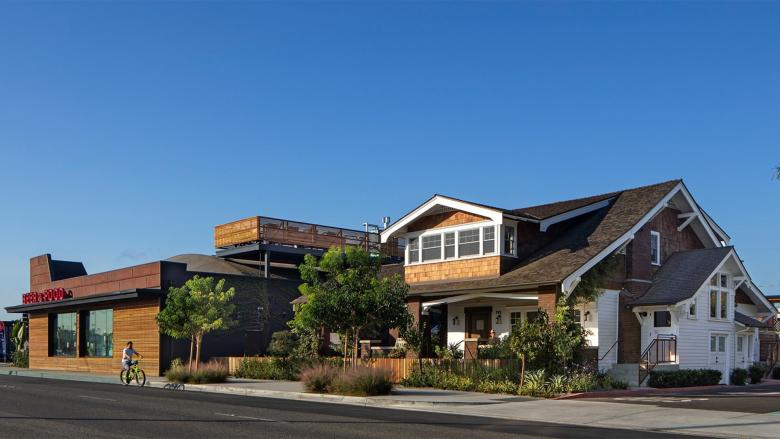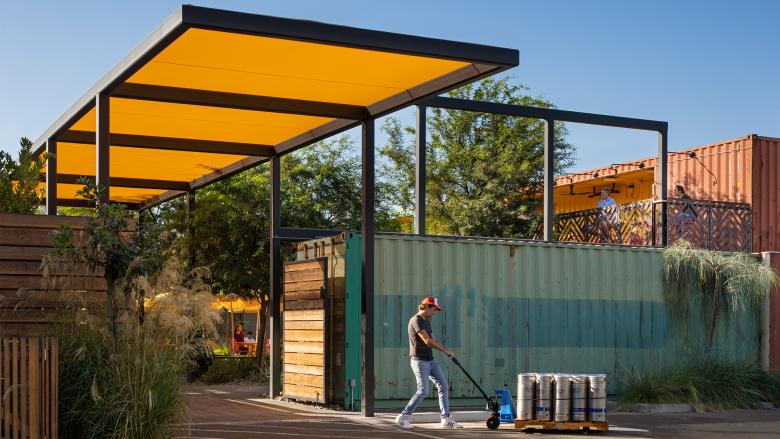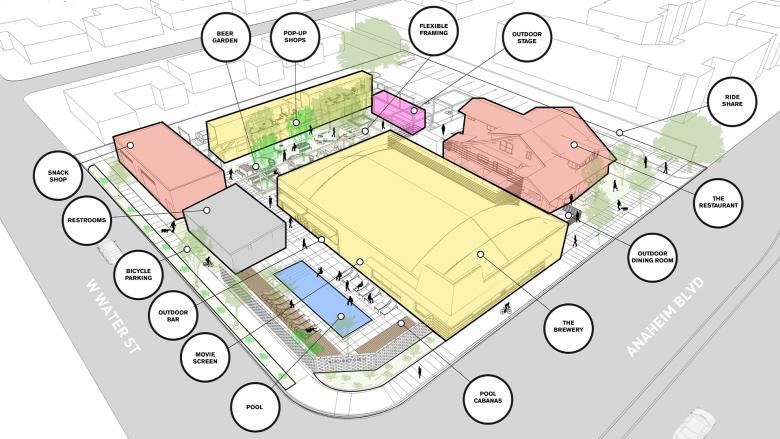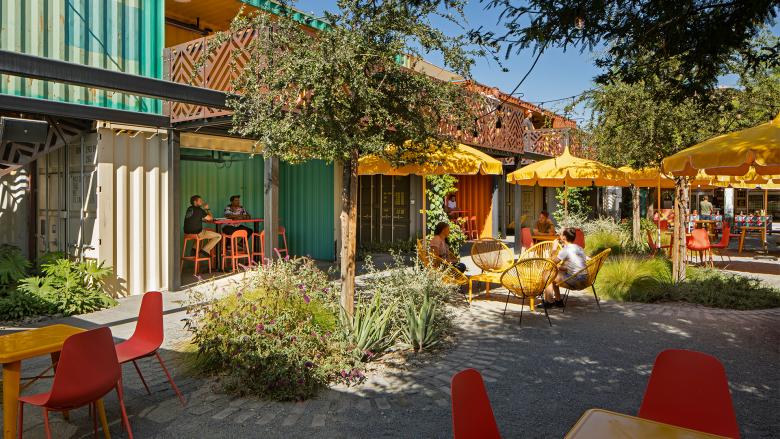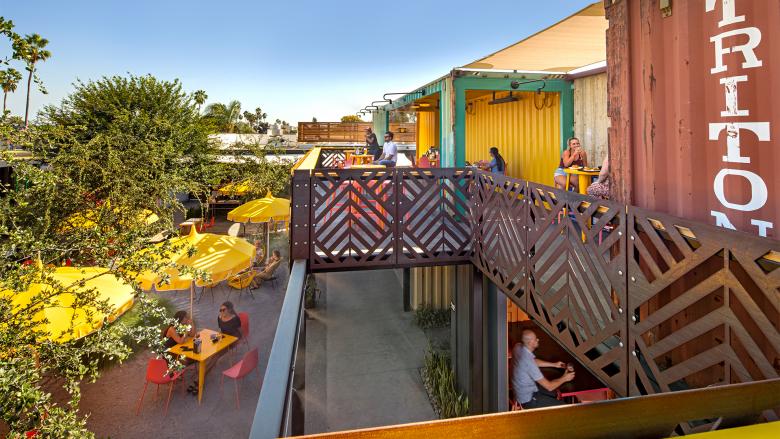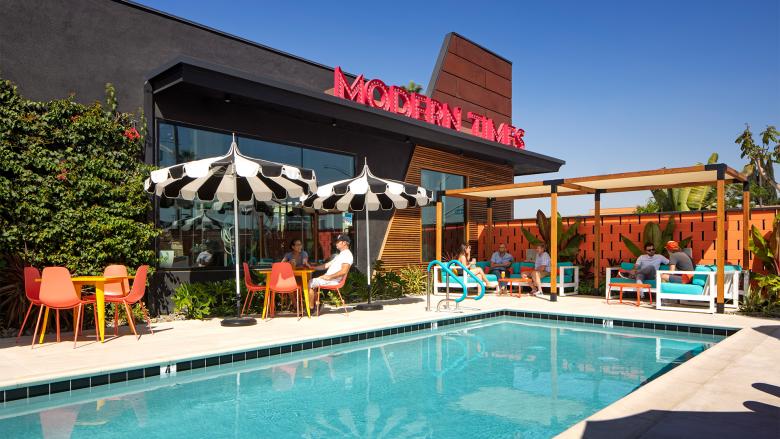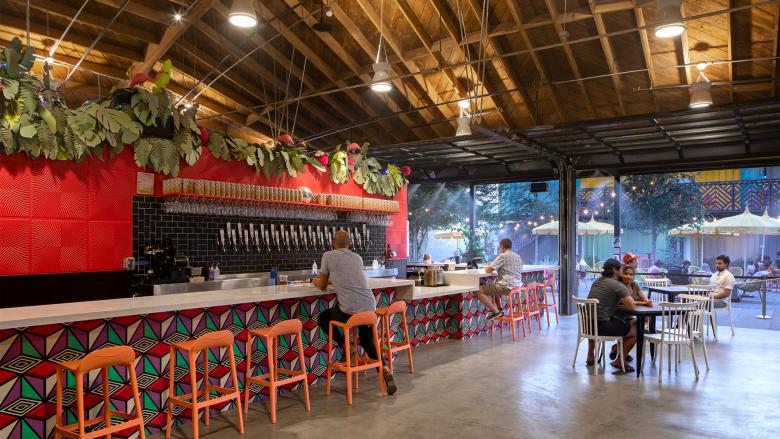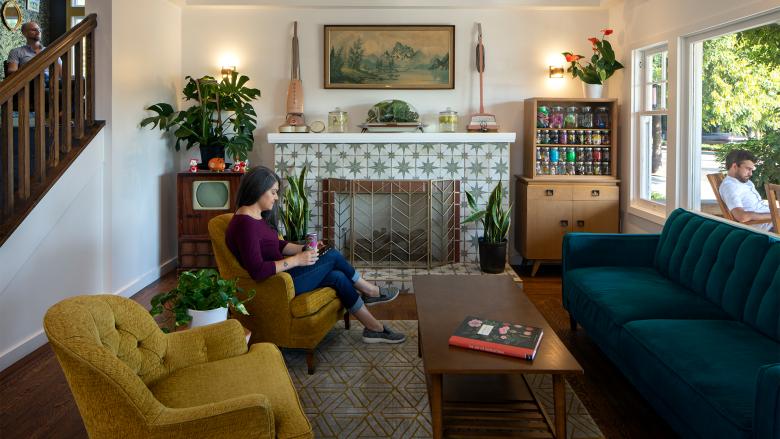US Building of the Week
Moderntimes at Leisuretown
A historic Craftsman home, a former grocery story, and a half-dozen repurposed shipping containers combine to create a destination for beer drinkers in Anaheim, California. Outdoor spaces are also part of the mix in Studio One Eleven's design for Moderntimes and Leisuretown. The architects answered a few questions about the project.
Location: Anaheim, California, USA
Client: The Lab Holdings
Architect: Studio One Eleven
- Design Principal: Michael Bohn
- Design Director: Scott Parker
- Project Manager: Tobin White
- Project Team: Felix Betancourt
MEP/FP Engineer: Schnackel Engineers, Inc.
Civil Engineer: Civil Works Engineers, Inc.
Landscape Architect: Land Lab
Lighting Consultant: Oculus Light Studio
Interior Designer: Studio One Eleven
Contractor: CB Kenner, Inc.
Site Area: 38,000 sf
Building Area: 15,000 sf
We were approached by our client, The Lab Holdings, who were inspired by one of our other projects, in nearby Santa Ana: The Roost, consisting of the restoration of a barn into a live-work unit, the conversion of a 1920s filling station into two retail spaces, and the restoration of Craftsman bungalow duplexes. Their project was in neighboring Anaheim and was originally intended to be a mixed-use project featuring a new kind of hotel with an Airbnb model (series of tiny houses). When asked how we would approach the site, we imagined it as a series of courtyards, each with his own unique look and feel. This inspired the clients to rethink the whole project as a food and beverage destination with multiple tenants (akin to our Steelcraft projects in Bellflower and Garden Grove). Eventually one company, Moderntimes, took over the whole development as a tasting site for their seventy-plus craft beers and ciders.
The expansive project adaptively reuses historic buildings, adds repurposed shipping containers, and creates garden spaces featuring comfortable outdoor furnishings and a swimming pool. The brewery’s distinct 33,000-square-foot campus includes:
- A historic, three-story Craftsman home, restored and renovated as a food and event space.
- A 1940s-era, barrel-vaulted structure that originally served the neighborhood as a grocery store; it is now restored and converted as the brewery building.
- Six repurposed shipping containers on two levels, as a venue for dining and food service, including an elevated lounge. The containers are sited to complement the existing structures and define the central courtyard.
- A 45-feet-long swimming pool, surrounded by lounge chairs and shade umbrellas, serving as a place to cool off during the day and watch movies at night
- Almost a third of an acre of outdoor seating nestled in lush gardens.
- Multiple outdoor dining areas to accommodate social distancing requirements.
- A former auto shop building that has been converted as the central kitchen, for food service and craft beers and wines.
- A walk-up store for take-home items and gifts, including 70 craft beers and ciders.
Restoring the property’s older structures, while infusing them with a new sense of vibrancy was a key goal. We believe that the reused buildings create the soul of the project. By preserving the buildings and blending them with new ones, we endeavored to create a better neighborhood that has a real relationship to its history; a neighborhood where people can enjoy these places and their stories.
The project site is located just outside of the Anaheim Colony Historic District, so the idea was to save the buildings in their place. This allowed the authenticity of the neighborhood to remain while bringing renewed vibrancy to the site.
In addition to what we mentioned in the first question, of how the project evolved from the initial design stage to the completion of the project, another thing to mention is how the project continues to evolve over time. Our architecture for this project acts as a theatrical infrastructure that allows Moderntimes to express their own "play." In other words, we created a physical infrastructure/trellis that is flexible, allowing Moderntimes to program it differently over time. Since its inception, the entire project has evolved to fit the character of the users. A large trellis running through the site currently acts as a shade structure which can be modified to act as a framework for artwork, water misters, speakers, lighting (like a rig in a Blackbox theatre). This feature invites people to come back again and again to experience something different every time.
This adaptive reuse project integrates the use of former shipping containers, repurposing 100% of the original material to create a space that continues to adapt and evolve over time. As we like to say, we used every piece of the buffalo. Moderntimes takes advantage of Southern California’s mild climate, focusing most of the seating outdoors amid drought tolerant landscaping. Guests can feel relaxed and safe, dining and drinking in the open air where social distancing can easily be accommodated.
Additionally, in an effort to reduce parking and promote carpooling and ridesharing service, the project is part of a city-wide program called FRAN (Free Rides Around the Neighborhood), that encourages people to drink responsibly. Describing the project as “the community’s backyard,” the owner said, “brewers today are bringing neighbors together – much like the pubs of London or Ireland serve as neighborhood gathering spaces.”
Email interview conducted by John Hill.
